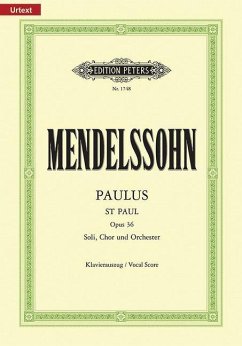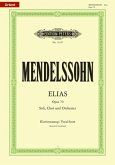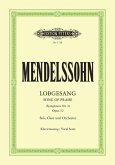For his Oratorio Mendelssohn made a discreet selection from St. Paul's eventful life as recounted in the acts of the Apostles. The story begins with the stoning of St. Steven by the Jews, and continues through his miraculous conversion to the scene in Lystra, where Paul himself is nearly martyred by stoning, and his farewell in Miletus. Hardly any Oratorio of the Romantic period, could match St. Paul in popularity. Only years later was it overtaken in the public esteem by Mendlessohn's Elijah. In the first two years following its premiere performance it was performed in over fifty German cities, in many European capitals and the United States. Paulus op. 36 (Klavierauszug): Für SATBB soli, Chor und Orchester Das Paulus-Oratorium ist ein Auftragswerk des Frankfurter Cäcilien-Verein. 1832 wurde es in Auftrag gegeben wurde und in seiner endgültigen Fassung 1836 in Liverpool aufgeführt. In zwei Teilen erzählt Mendelssohn in diesem Werk die Geschichte des Apostels Paulus. Dramatische wichtige Szenen lässt der Komponist aus. Es geht Mendelssohn nicht um die Nacherzählung der Apostelgeschichte sondern um die Darstellung der Persönlichkeit des Paulus. In dieser Form ist das Oratorium ein Appell zur Bekehrung.
Bitte wählen Sie Ihr Anliegen aus.
Rechnungen
Retourenschein anfordern
Bestellstatus
Storno








![Messiah [Der Messias] HWV 56 / URTEXT Messiah [Der Messias] HWV 56 / URTEXT](https://bilder.buecher.de/produkte/13/13391/13391348m.jpg)